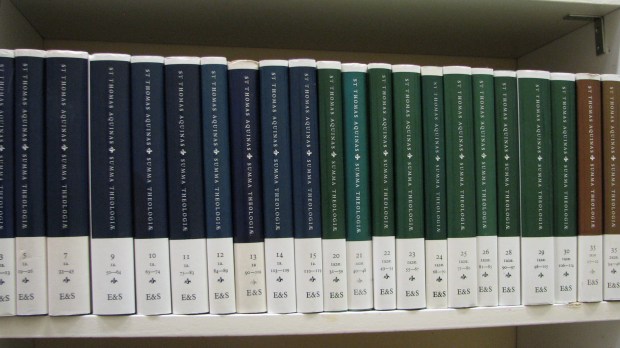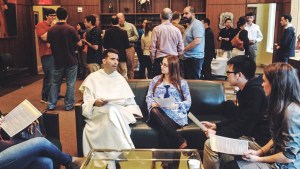Since 2019, a project to bring the wisdom of St. Thomas Aquinas to the modern world has reached millions of people. Now, Aquinas101.com is taking a major step to further advance St. Thomas’ philosophy.
A project of the Washington, DC-based Thomistic Institute, Aquinas 101 takes the 13th-century saint’s most famous work, The Summa Theologiae, and breaks it open for ordinary people, even if they have no prior training in philosophy.
Previously, that has been done mostly through YouTube, with email notifications going to Aquinas 101’s 103,000 subscribers when new videos are available.
This fall, the project will launch a “learning platform” that will allow those who open a free account to better navigate videos, search the video library for specific topics, and ask questions. Viewers can progress through revamped courses to earn certificates of achievement.
The website will have an interactive Latin-English Summa Theologiae.
“Essentially our move here is to try to make it a more user-friendly experience,” said Fr. Ambrose Little, OP, one of the team of Dominican Friars who guide Aquinas 101 and provide online instruction.
“This initiative takes viewers on a journey through Aquinas’ works, delving into crucial questions about the nature of humanity, God, happiness, and the relevance of Jesus Christ in our contemporary world,” said Alain Latour, a computer systems analyst at the Thomistic Institute.
In addition, there are supplemental readings and podcast lectures curated by Dominican friars to complement each video.
Learning at an early age
The Aquinas 101 YouTube channel has had 8.5 million views in 150 countries since its creation in 2019.
“The idea of Aquinas 101 is really a kind of entry-level sort of experience,” said Fr. Little. “It can be intimidating to open up a Summa and see this question-and-answer format that’s rather mysterious, using words that are often really difficult – and certainly non-standard usages of those words. So the idea of Aquinas 101 from the beginning was to give people a kind of introduction to the material that’s easily accessible. And, you know, we have people watching these videos from eight-year-olds up to professors of philosophy and theology sending questions to us.”
An eight-year-old watching videos about Thomistic philosophy? Fr. Little related an anecdote about a father whose children wanted to watch videos before going to bed. “Okay,” he said, “but only if you watch a video of Aquinas 101.” It helps that the videos contain a lot of animation, in addition to a friar clad in a black and white habit giving a talk.
Later, it turned out that the child had an easier time explaining Thomas’s concept of motion than his father did.
“Your faith seems reasonable”
Fr. Little has gotten other feedback of how Aquinas 101 has helped people discover the Catholic faith or Catholics grow in that faith.
“We have a Christmas video from last year, where we just asked the question, ‘What has Aquinas 101 done for you?’” the friar said. “And a large number of them were people who were in the sciences, who said, ‘We didn’t realize that faith and philosophy could interact with science. And this has really kind of increased my faith as a practicing scientist or a doctor’ or things like that.”
Two prominent scientists who are Catholic help along those lines. Karin Öberg, a Harvard University astronomer, and Jonathan Lunine of Cornell University, one of the lead scientists on the James Webb telescope, are lay presenters in the faith and science section of Aquinas 101.
“Part of the reason for bringing them in is that they themselves have had a powerful experience of our Lord Jesus Christ along the way. And these are like high-powered scientists,” Fr. Little explained. “Both of them are obviously high-powered, intelligent people, but are also very deeply committed to the faith and passing on the faith to others and showing that what we learn in science coheres with what God teaches us in Revelation.”
There even seems to be an openness on the part of skeptics.
“I’ve had non-believers in the comments say, ‘You know, I don’t believe in God, but I find this helpful because it makes your faith seem reasonable,’” Fr. Little said. “And you see them commenting on several videos, so obviously, they’re watching a few more. That shows that we’re reaching a broader audience and one that would like to learn more, and we’d like to accommodate that.”
The new learning platform of Aquinas 101 will do just that.
Interested readers can visit the current version of A101 or sign up to be notified when the new platform goes live.



